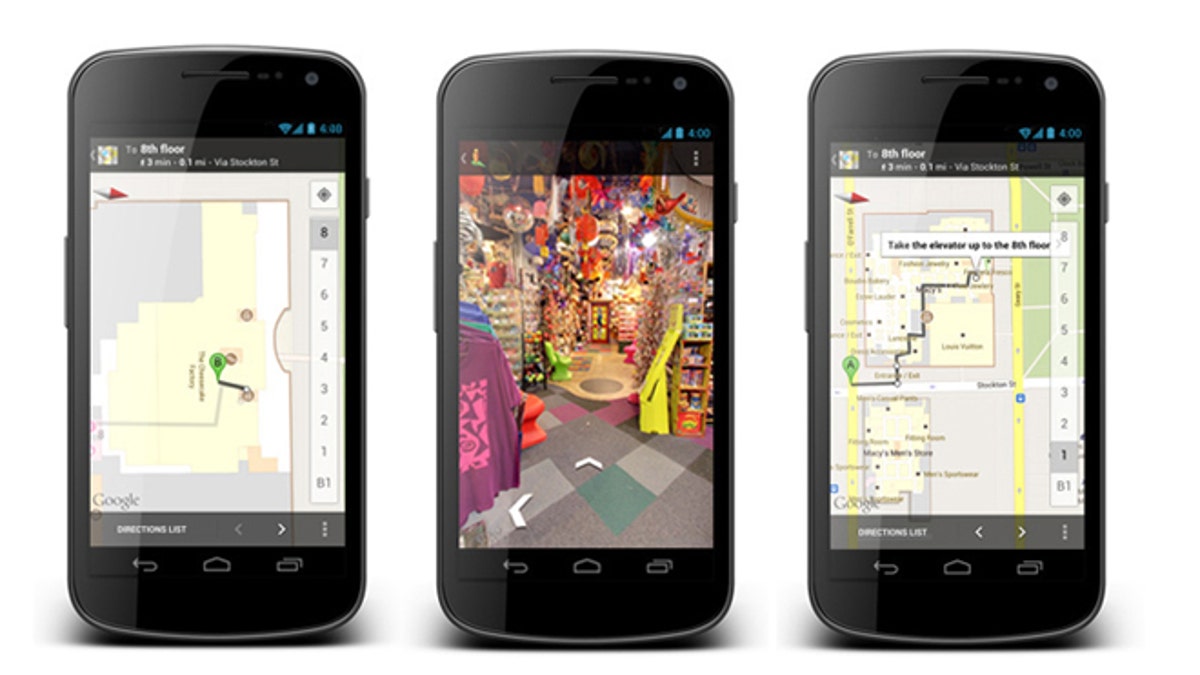
May 9, 2012: A new update to Google Maps offers not just maps of indoor locations but walking directions within buildings. (Google)
SAN FRANCISCO – Google Maps have found their way back to the iPhone.
The world's most popular online mapping system returned late Wednesday with the release of the Google Maps' iPhone app. The release comes nearly three months after Apple Inc. replaced Google Maps as the device's built-in navigation system and inserted its own maps into the latest version of its mobile operating system.
Apple's maps proved to be far inferior to Google's. The product's shoddiness prompted Apple CEO Tim Cook to issue a rare public apology and recommend that iPhone owners consider using Google maps through a mobile Web browser or seek other alternatives until his company could fix the problems. Cook also replaced the executive in charge of Apple's mobile operating system after the company's maps became a subject of widespread ridicule.
[pullquote]
Among other things, Apple's maps misplaced landmarks, overlooked towns and sometimes got people horribly lost. In a particularly egregious example flagged this week, Australian police derided Apple's maps as "life-threatening" because the system was steering people looking for the city of Mildura into a sweltering, remote desert 44 miles (71 kilometers) from the desired destination.
- Facebook poised to roll out more privacy controls
- Best holiday gadget gifts for dear old dad
- Hot or not? Guess which iPhone apps are still available
- $1,300?! Company launches obscenely expensive tablet
- Apple vs. Samsung: Can’t we all just get along?
- The Dumbest, Craziest, and Most Useless iPhone Apps From A to Z
- Tech gifts to ho, ho, hope for
- Georgia Tech building ‘Decepticons’
Google Inc., in contrast, is hailing its new iPhone app as a major improvement from the one evicted by Apple.
"We started from scratch," said Daniel Graf, mobile director of Google Maps. Google engineers started working on the new app before Apple's Sept. 19 ouster, Graf said, though he declined to be more specific.
Digital Trends: 5 wrong turns in Apple’s iOS 6 Maps app
The additional tools in the free iPhone mapping app include turn-by-turn directions. Google's previous refusal to include that popular feature on the iPhone app while making it available for smartphones running on its own Android software is believed to be one of the reasons Apple decided to develop its own technology. The friction that has developed between Google and Apple as they jostle for leadership in the increasingly important smartphone market also played a role in the mapping switch.
Google's new iPhone mapping app also will offer its street-level photography of local neighborhoods for the first time on Apple's mobile operating system, as well as three-dimensional views, public transit directions and listings for more than 80 million businesses. The iPhone app still lacks some of the mapping features available on Android-powered phones, such as directions in malls and other buildings.
There still isn't a Google mapping app for Apple's top-selling tablet computer, the iPad, but the company plans to make one eventually. Google, which is based in Mountain View, California, declined to say when it hopes to release an iPad mapping app. For now, iPad owners can use the maps in an iPhone mode. That won't be the best experience, but it still may be better than Apple's maps on the iPad.
Digital Trends: iPad Mini vs Kindle Fire HD vs Nexus 7: In-depth comparison
Google's free mapping solution is likely to become one of the hottest commodities in Apple's app store, if for no other reason because of pent-up demand among iPhone owners fed up with Apple's alternative. Some iPhone owners even refused to upgrade to Apple's newest software, iOS 6, because they didn't want to lose access to the old Google mapping application built into iOS 5 and earlier versions.
Apple didn't respond to a request for comment about Google's new apps late Wednesday, but it approved the technology before its release.
Graf said Google isn't hoping to make Apple look bad with its new mapping app. "On maps, we have a friendly relationship," he said.
